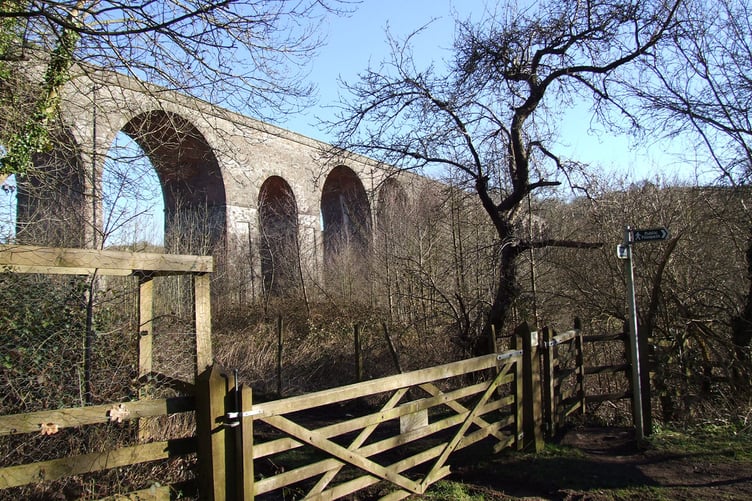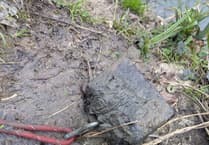Pensford viaduct is a striking viaduct spanning the River Chew as it flows towards and through Pensford. Although there is no access to the viaduct, it dominates Pensford and its magnificence can be enjoyed from many focal points throughout the village. The viaduct’s structure number of FNS3/17m 4ch can be seen from Stanton Lane below the viaduct.
The viaduct is believed to have taken around 10 years to build and was completed to coincide with the opening of Pensford Station (which was located in what is now Station Approach) on 3rd September 1873. It was built to carry the Bristol & North Somerset Railway and transport passengers and goods (mainly coal) between Bristol (and its floating harbour) and Radstock (and the north Somerset coalfields) with services later being extended to Frome.
Although not impacted by the ‘Beeching cuts’ announced in 1963, the last scheduled passenger train was on 31st October 1959. After this, there were only goods trains (again, mainly coal) which ceased in June 1964 and, thereafter, very occasional excursion trains. It officially closed after the 1968 flood due to the structure having been weakened.
The viaduct comprises six discrete sections: four arches extend from the abutment, followed by a smaller arch, then a series of three arches and a king pier. This arrangement is mirrored to reach the other abutment, forming the complete 16 arch structure, which is 303m long and 29m high and was built with local stone but with brick soffits to the arches.
In September 1975, there was a village fair in Pensford and, unbelievably, one of the highlights was an escapologist in a straightjacket escaping from a flying bomb hanging upside down from the viaduct! Although thankfully not a tragic ending, it seems the rope that suspended the bomb from the plane burned through at some point during the day!
In September 1984, the viaduct was Grade II listed and that same year, it was offered for sale for £1. Although it was offered up for sale with a maintenance grant of £70,000, the associated liabilities meant there were no takers.
Ownership and responsibility of the viaduct has varied over the years. When British Rail was privatised in 1994, ownership of the operating railway infrastructure passed to Railtrack and, in 2002, to Network Rail. However, those assets that related to closed lines, redundant bridges and tunnels, abutments, cuttings and viaducts (which was the case for Pensford viaduct), together known as the ‘Burdensome Estate’, first of all stayed with the British Railways Board (Residuary) (BRBR), a wholly owned subsidiary of the Strategic Rail Authority (SRA). When the SRA was dissolved in 2005, BRBR passed to the Department for Transport which, in 2013 was split up with the bulk of its 3,800 assets, including 74 listed structures, passed to the Highways Agency’s Historical Railways Estate (HRE) who are the people currently responsible for Pensford viaduct.
During 2002 and 2003, maintenance work was carried out to improve the deck and its associated drainage with work undertaken on piers, drains and arches. The downpipe hoppers bear the date of 2002.
In August 2015, emergency repairs were carried out where the poor condition of the viaduct had resulted in masonry falling from the eastern parapet onto a public footpath below. Work included the outside face of the parapet being rebuilt and / or repaired. An area of re‑pointing on the parapet also took place to ensure its long-term stability and joints between some of the affected coping stones were raked out and re-pointed.
During 2022, an inspection was carried out and ecology surveys followed. In the time since the 2003 maintenance, water had been getting into open joints within the parapets and this water had subsequently frozen and then expanded resulting in the mortar popping off. Sadly, each time the cycle of freezing and thawing repeated itself, the problem worsened. So, from April through to September 2023, HRE has implemented a long-term fix. HRE’s contractors have worked closely with local heritage officers and have used traditional lime-based mortar and a specially designed scaffolding rig which moves on tracks along the full length of the viaduct.
National Highways, Historical Railways Estate (HRE) have produced a video tour which includes some great footage and background on these recent works as well as some work undertaken earlier in 2023 on the [former railway] bridge on Parsonage Lane. See the video below.





Comments
This article has no comments yet. Be the first to leave a comment.